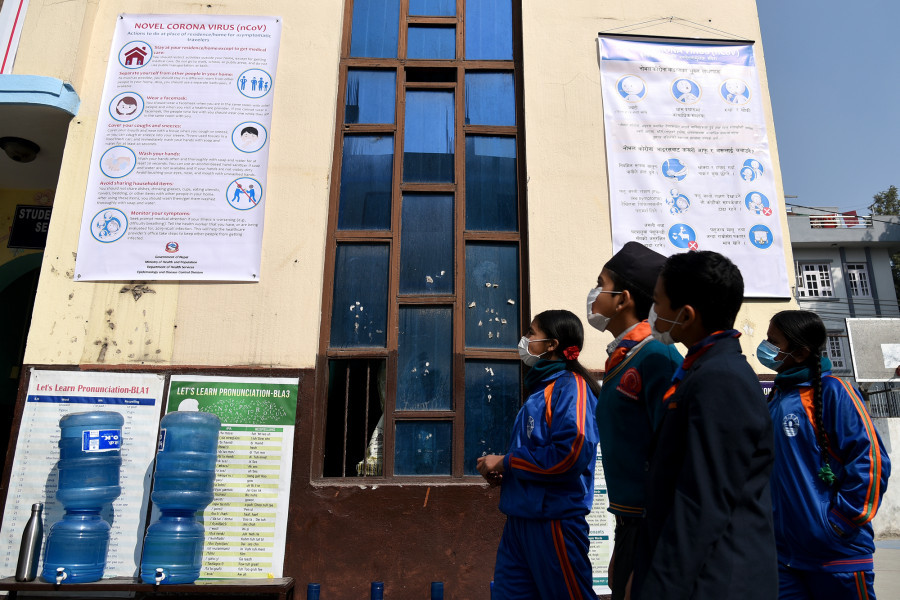Health
Keep using face masks until vaccines become available, experts say
As it might take months, if not years, for vaccines to be available in Nepal, wearing masks and maintaining distance should be the new norm, they point out.
Arjun Poudel
Last week, an official from the Ministry of Health and Population was alarmed when he met doctors and other health workers in Chitwan and Pokhara who were neither using masks nor maintaining social distance.
When he reminded them about the risk of Covid-19, a doctor proudly told him that they were not wearing masks as all of them were from the medical community, and they had not been infected with coronavirus.
“When doctors and other health workers do not follow safety protocols, what would the general people learn from them?” the official, who asked not to be named, told the Post.
“The fact is that doctors and health workers are highly vulnerable to coronavirus infection and they could play the role of superspreaders.”
With the number of positive cases starting to decline and the government allowing most businesses to reopen, safety measures, including the use of face masks and social distancing, have been forgotten in public places.
Authorities, who once penalised people for not wearing masks in public, have stopped enforcing the measure as the general public’s attention has been diverted towards coronavirus vaccines.
Public health experts, however, say that it may take months, if not years, for vaccines to arrive in Nepal and reach the general people.
“It is not certain how long it will take for the vaccine to become available in Nepal and for all the people to get the jab,”Dr Niraj Bam, associate professor at the Institute of Medicine, told the Post. “Masks are available to us now and it does not cost a lot. Maintaining social distance does not cost money. We should keep wearing masks and maintaining social distance.”
The roll-out of some coronavirus vaccines and the government’s preparation to acquire vaccines have been making headlines in the media for the last few weeks. However, several reports suggest that rich nations “have hoarded” vaccines to hedge their bets.
According to Reuters, Amnesty International and other groups last week said that rich countries have secured enough coronavirus vaccines to protect their populations, but are possibly depriving billions of people in poorer areas of the vaccines.
Doctors say that even if the number of new cases of Covid-19 is declining due to various factors, including limited testing, the risk of infection has not gone down and the pandemic is far from over.
“Use of masks not only saves people from coronavirus, but also from many viral infections, including seasonal influenza, rhinovirus, adenovirus and others,” Dr Raju Pangeni, consultant pulmonologist and critical care expert, told the Post. “Proper use of masks also protects us from bacterial infections, including tuberculosis.”
Everyday, over 46 people die of tuberculosis throughout the country, according to the National TB Prevalence Survey 2018-019.
Doctors say proper use of face masks also helps reduce the effects of air pollution. The air quality in Kathmandu Valley gets worse and reaches unsafe levels once winter sets in. They said that polluted air worsens the spread of coronavirus and severity of its infection.
“The virus keeps spreading until people are immunised,” Dr Prabhat Adhikari, infectious disease and critical care expert, told the Post. “We should not give up masks and other safety measures.”
Several studies show that infection rate has declined in countries where masks are mandatory and spiked in those where masks have not been made compulsory.
According to Adhikari, masks, if properly used, work in the same way the vaccines do.
“Face masks filter the virus from entering the body,” said Adhikari. “ Even if a person inhales the virus he/she inhales little of it. This prevents them from becoming seriously ill. A little amount of the virus helps produce antibodies in the body like the vaccine.”
Moreover, use of face masks is required even after the vaccines, as none of the vaccines are 100 percent efficacious and risk of spread of infections remains until all the people are immunized with vaccines.
“Masks are the new normal for the years to come,” Dr Anup Baastola, spokesperson for the Sukraraj tropical and Infectious Disease Hospital told the Post. “Wearing face masks and following safety measures is needed for one’s own safety. We can keep ourselves and our friends and relatives safe by wearing masks.”




 18.12°C Kathmandu
18.12°C Kathmandu















